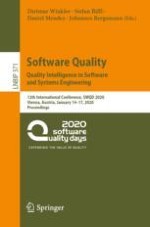This book constitutes the refereed proceedings of the 12th Software Quality Days Conference, SWQD 2020, held in Vienna, Austria, in January 2020.
The Software Quality Days (SWQD) conference started in 2009 and has grown to the biggest conference on software quality in Europe with a strong community. The program of the SWQD conference is designed to encompass a stimulating mixture of practical presentations and new research topics in scientific presentations. The guiding conference topic of the SWQD 2020 is “Quality Intelligence in Software and Systems Engineering”.
The 5 full papers and 2 short papers presented in this volume were carefully reviewed and selected from 17 submissions. The volume also contains 2 invited talks. The contributions were organized in topical sections named: industry challenges and collaborations; software testing approaches; social aspects in software engineering; natural language processing; and software quality assurance concepts.
